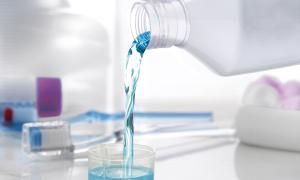CPC in mouthwashes is shown in humans to break the membrane of SARS-CoV-2 and reduce the amount of active virus in saliva

A clinical trial shows that rinsing the mouth for one minute with mouthwashes containing 0.07% Cetylpyridinium Chloride (CPC) reduces the number of infectious viruses in saliva such as SARS-CoV-2
A study led by the Fight Infections Foundation together with the IrsiCaixa AIDS Research Institute –a centre jointly promoted by the "la Caixa" Foundation and the Department of Health of the Generalitat de Catalunya– and the Gerencia Territorial Metropolitana Nord of the Catalan Health Institute (ICS), with the collaboration of DENTAID Research Center, has demonstrated the virucidal activity in saliva of mouthwashes with Cetylpyridinium Chloride (CPC) against SARS-CoV-2, confirming in vivo results previously observed in in vitro studies conducted by IrsiCaixa researchers.
This research, based on saliva samples from infected people seen in primary care centres, confirms the ability of CPC to break down the virus membrane. The study has demonstrated in vivo that SARS-CoV-2 loses its infectious capacity, as the destroyed membrane prevents it from penetrating cells. Therefore, mouthwashes with 0.07% CPC could be an effective preventive tool against infection caused by the multiple variants of the coronavirus.
"The fact that a mouthwash containing CPC is able to reduce the infectivity of SARS-CoV-2 in saliva is very good news, as the use of this mouthwash could reduce human-to-human transmission of the virus", says Dr Andrea Alemany, researcher at the Fight Infections Foundation and first author of the study.
Dr Núria Prat, director of Primary Care of the Metropolitana Nord of the ICS, highlights the role of primary care in research: "the fact of having direct access to a large volume of population, as well as the joint work of Family Medicine, Nursing and Dentistry professionals from the primary care centres, has allowed us to carry out the fieldwork necessary to conduct the study".
A recent report by the World Health Organisation (WHO) emphasises the important role that prevention and care of the oral cavity plays in good general health, and the close relationship with cardiovascular diseases and diabetes, among others. "The results of this study allow us to confirm that the clear relationship between the oral cavity and COVID-19, already demonstrated before, may also lead to a possible way to prevent its dissemination", concludes Dr Joan Gispert, director of R&D&I at DENTAID.
Study methodology
This study, published in the Journal of Dental Research, is the result of a randomised, double-blind, parallel, placebo-controlled clinical trial carried out in 19 primary care centres in the Metropolitana Nord de Catalunya from February to June 2021. It involved 118 adults with asymptomatic SARS-CoV-2 infection or with mild symptoms of COVID-19, in whom the amount of virus with infectious capacity was analysed by ELISA test. "With this test, unlike PCR, we can see the ability of CPC to break the virus membrane, since it detects the proteins of the SARS-CoV-2 nucleocapsid, which are found inside the virus", explains Dr Nuria Izquierdo-Useros, principal investigator at IrsiCaixa and co-author of the article. The dentistry teams of the collaborating primary care centres of the Metropolitana Nord (ICS) were in charge of carrying out the study procedures, coordinated by the reserachers of the Fight Infections Foundation. In addition, all the samples were analysed in the Microbiology Department of the Clinical Laboratory of the Metropolitana Nord and at IrsiCaixa.
A healthy habit
These findings affirm that the use of mouth rinses could be added to other strategies to prevent the spread of SARS-CoV-2, especially now that the implementation of protective measures, such as the use of face masks, is declining.